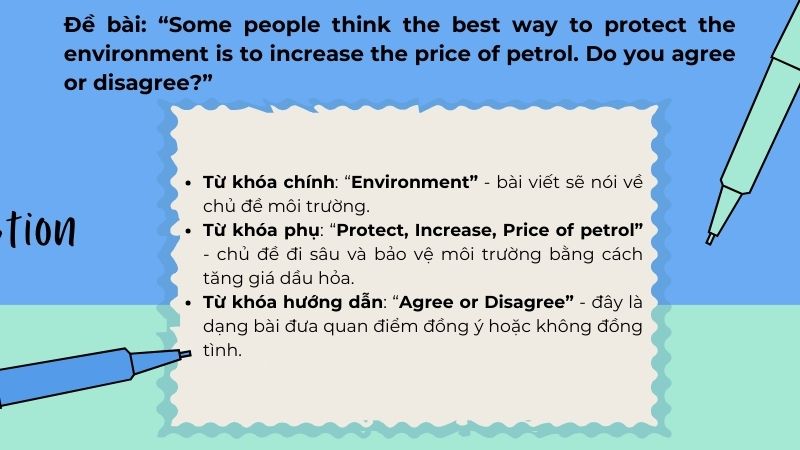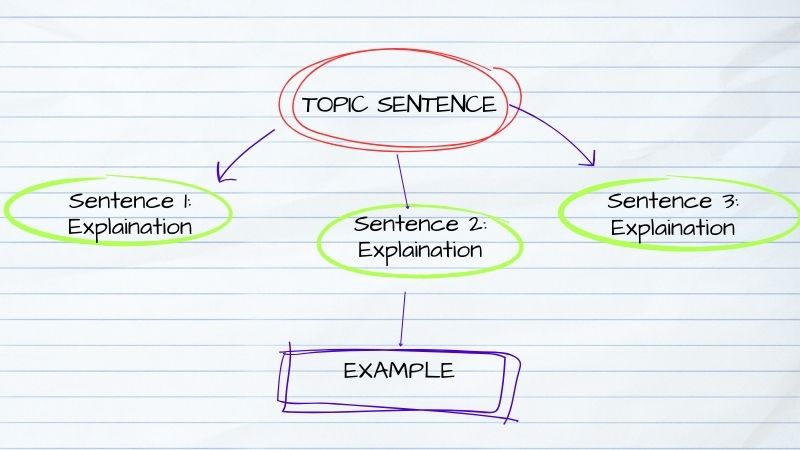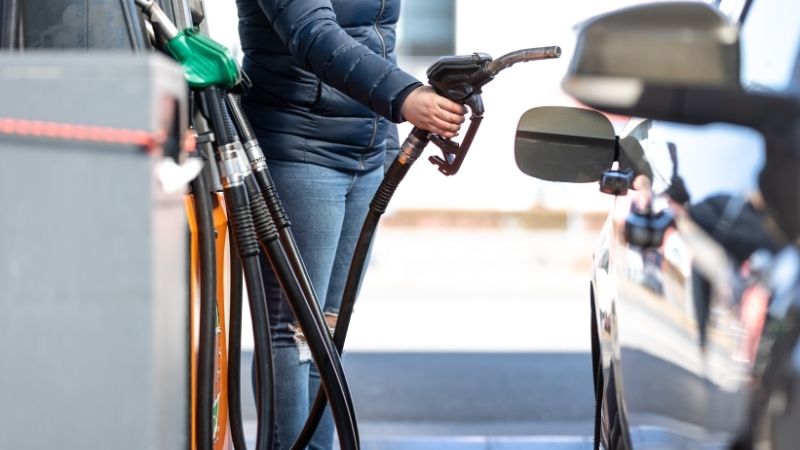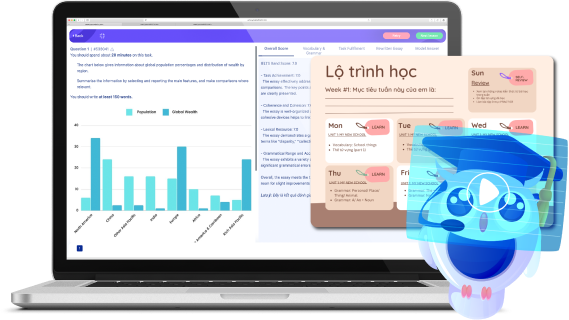IELTS Writing Task 2 Environment topics có độ phổ biến cao và thường được đánh giá là không quá khó. Hãy xem với chủ đề khá “quen mặt” này, Edmicro có thể giúp bạn có cách tiếp cận thú vị hơn như thế nào nhé.
Cách triển khai IELTS Writing Task 2 Environment
Với mỗi câu hỏi chủ đề Environment IELTS Writing task 2, cách tiếp cận cụ thể sẽ khác nhau. Tuy nhiên, quy trình xử lý đề sẽ đều đi qua các bước sau
Bước 1: Phân tích yêu cầu đề bài IELTS Writing Task 2 Environment topics
Trong bước này, bạn cần đọc kỹ để hiểu yêu cầu của đề. Về độ dài, IELTS Writing task 2 yêu cầu bạn viết 1 bài văn tối thiểu 250 từ. Về nội dung, bạn cần gạch chân các keywords trong câu hỏi để xác định vấn đề cụ thể được yêu cầu.
Quan sát ví dụ sau để hiểu cách phân tích đề bài.

Như vậy, khi phân tích yêu cầu của đề, chúng ta luôn cần tìm ra các từ khóa chính, phụ, cũng như các từ hướng dẫn. Những keywords này sẽ giúp chúng ta xác định được yêu cầu của đề bài, tránh làm lạc đề.
Bước 2: Phân tích và tư duy về vấn đề
Việc phân tích và tư duy về vấn đề (Brainstorming) sẽ giúp bạn phát triển các ý tưởng theo nhiều hướng. Kết quả của bước này là các luận điểm cụ thể cho bài viết và một bố cục sơ lược. Từ đó, bài viết của bạn sẽ có chiều sâu và đảm bảo được tính liên kết, mạch lạc.
Bước 3: Lập dàn ý
Một bài viết IELTS Task 2 Environment hoàn chỉnh sẽ có 3 phần: mở bài, thân bài và kết bài.
- Mở bài: Giới thiệu chủ đề và các vấn đề sẽ được giải quyết trong bài viết. Với các bài yêu cầu trình bày quan điểm thì mở bài sẽ là quan điểm của bạn.
- Thân bài: Đưa ra các luận điểm và phân tích, giải thích. Sau đó bạn chứng minh bằng các ví dụ.
Để tăng thêm tính độc đáo cho bài viết, bạn có thể thể hiện nhiều góc nhìn về vấn đề và đưa ra giải pháp từ góc độ cá nhân.
- Kết bài: Khẳng định lại vấn đề

Với thời gian làm bài có hạn, bạn có thể không cần lập một dàn ý chi tiết. Bạn chỉ cần viết ra các ý chính và một số ý phụ để khi viết không bị lạc đề hay chệch với định hướng ban đầu.
Bước 4: Viết bài
Dựa trên dàn ý đã lập, bạn bắt đầu viết bài. Một bài IELTS Writing Task 2 thường bao gồm 2 đoạn thân bài. Trong mỗi đoạn, bạn có thể viết theo cấu trúc như sau:
- Topic Sentence: Câu mở đoạn
- Explanation: 3-4 câu để giải thích và bảo vệ luận điểm cho câu mở đoạn
- Example: Có thể đưa thêm ví dụ cho mỗi luận điểm để bài viết có tính trực quan hơn.

Xem thêm: Học Writing chuyên sâu cùng Edmicro – ứng dụng tích hợp công nghệ AI hàng đầu
Lưu ý rằng tùy theo từng dạng bài mà chúng ta lại có cách chia luận điểm theo từng đoạn khác nhau. Ví dụ với dạng Advantages – Disadvantages. Bạn có thể dành 1 đoạn để nói về lợi ích, và đoạn còn lại để trình bày về bất lợi.
Bước 5: Kiểm tra
Ở bước cuối cùng này, bạn tiến hành soát lỗi chính tả và kiểm tra tính liên kết giữa các ý, đảm bảo không có ý nào đi lạc chủ đề.
Từ vựng chủ đề Environment IELTS Writing Task 2
Để hoàn thành tốt IELTS Writing task 2 Environment, từ vựng là yếu tố vô cùng quan trọng. Lexical resource (Nguồn từ vựng) cũng là 1 trong 4 tiêu chí chấm điểm trong bài thi Writing của bạn.
Dưới đây là bảng từ vựng được Edmicro tổng hợp cho chủ đề Environment IELTS Writing task 2.
| STT | Từ | Từ loại | Phiên âm | Nghĩa | Ví dụ |
| 1 | pollution levels | n | /pəˈluːʃn ˈlevl.z/ | các mức độ ô nhiễm | We have a serious issue with pollution levels in some of our big cities.→ Ở một số thành phố lớn, chúng tôi có vấn đề nghiêm trọng liên quan đến các mức độ ô nhiễm môi trường. |
| 2 | poaching | n | /pəʊtʃiŋ/ | săn bắn trái phép | The farmer claimed that he shot the men because they were poaching on his land.→ Người nông dân nọ cho rằng ông ấy bắn đám người kia vì họ săn bắn trộm trên đất của ông ta. |
| 3 | oil spill | n | /ɔɪl spɪl/ | tràn dầu | The risks of oil spill in both areas are increased by sea conditions and the presence of sea ice and icebergs.→ Nguy cơ tràn dầu ở cả hai khu vực có thể tăng lên bởi tình trạng của biển và sự xuất hiện của băng trôi. |
| 4 | toxic waste | n | /ˈtɑːksɪk weɪst/ | chất thải độc hại | There are factories that empty toxic waste into rivers and oceans and therefore damage the natural world.→ Có những nhà máy xả thải độc hại ra các con sông và ra biển, do đó phá hủy môi trường tự nhiên. |
| 5 | wildlife conservation | n | /ˈwaɪldlaɪf ˌkɑːnsərˈveɪʃn/ | bảo tồn động vật hoang dã | It’s lucky we have lots of organisations that focus on wildlife conservation.→ Thật may là chúng ta có nhiều tổ chức với mục tiêu chính là bảo vệ động vật hoang dã. |
| 6 | man-made disaster | n | /ˌmæn ˈmeɪd dɪˈzæstər/ | thảm họa do con người gây ra | There are various worldwide agencies that are always the first on the scene with humanitarian aid after natural and man-made disasters.→ Trên thế giới có rất nhiều tổ chức luôn luôn là những người đầu tiên xuất hiện để cứu trợ khi xảy ra những tai họa từ thiên nhiên hoặc do con người gây ra. |
| 7 | future generations | n | /ˈfjuːtʃər ˌdʒenəˈreɪʃn.z/ | các thế hệ tương lai | Our future generations will be severely affected if we continue to use natural resources like this.→ Nếu chúng ta tiếp tục sử dụng lãng phí tài nguyên như hiện tại, các thế hệ sau sẽ chịu ảnh hưởng nặng nề. |
| 8 | (to) get back to nature | v | /ɡɛt bæk tuː ˈneɪʧə/ | hòa mình với thiên nhiên | I’m a city person through and through and don’t get back to nature very often.→ Tôi là một người ưa cuộc sống đô thị và ít khi sống hòa mình với thiên nhiên cho lắm. |
| 9 | exhaust fumes | n | /ɪɡˈzɔːst fjuːmz/ | khí thải | Exhaust fumes from cars and lorries are definitely one reason for the environmental problems in my country.→ Khí thải từ các loại ô tô và xe tải chắc chắn là một nguyên nhân cho những vấn đề môi trường hiện hữu tại đất nước tôi sống. |
| 10 | flash floods | n | /ˌflæʃ ˈflʌd/ | lũ quét | In my country we have flash floods and heatwaves on a yearly basis.→ Ở đất nước tôi, hàng năm chúng tôi phải chịu lũ quét và các đợt nắng nóng. |
| 11 | environmentally friendly | adj | /ɪnˌvaɪrənmentəli ˈfrendli/ | thân thiện môi trường | My parents always try to buy environmentally friendly products if they have the chance to help the environment.→ Để bảo vệ môi trường, bố mẹ tôi luôn cố gắng mua những sản phẩm thân thiện môi trường mỗi khi họ có cơ hội. |
| 12 | (be) on the brink of extinction | adj | /ɒn ðə brɪŋk ɒv ɪksˈtɪŋkʃᵊn/ | đang đứng trước nguy cơ tuyệt chủng | Before the captive breeding program in zoos, the giant panda was on the brink of extinction.→ Trước khi có chương trình nuôi giống trong sở thú, loài gấu trúc khổng lồ đã trên bờ vực tuyệt chủng. |
| 13 | (to) discharge toxic chemical waste | v | /dɪsˈʧɑːʤ ˈtɒksɪk ˈkɛmɪkᵊl weɪst/ | xả chất thải hóa học độc hại | Nowadays, more and more industrial companies are discharging toxic chemical waste into rivers, causing death to many fish and other aquatic animals.→ Ngày càng nhiều công ty ở khu công nghiệp đang xả các chất thải hóa học độc hại ra sông ngòi, gây chết cá và những loài thủy sản khác. |
| 14 | (to) deplete natural resources | v | /dɪˈpliːt ˈnæʧᵊrᵊl rɪˈsɔːsɪz / | làm suy giảm nguồn tài nguyên thiên nhiên | Timber companies must not be allowed to deplete natural resources by cutting down trees without planting new trees to replace them.→ Các công ty khai thác gỗ không được phép làm suy giảm nguồn tài nguyên thiên nhiên khi chặt cây mà không trồng cây thay thế. |
| 15 | (to) take action on global warming | v | /teɪk ˈækʃᵊn ɒn ˈɡləʊbᵊl ˈwɔːmɪŋ/ | hành động ứng phó với hiện tượng nóng lên toàn cầu | There have been numerous international conferences to warn of the dangers, but many governments have refused to take action on global warming.→ Có rất nhiều hội thảo quốc tế được tổ chức nhằm cảnh báo về tác hại của hiện tượng nóng lên toàn cầu, nhưng nhiều chính phủ vẫn từ chối hành động ứng phó với hiện tượng này. |
| 16 | (to) cut down on emissions | n | /kʌt daʊn ɒn ɪˈmɪʃᵊnz/ | giảm lượng khí thải | People must be made aware of the need to cut down on emissions from their cars if we are to reduce air pollution.→ Mọi người cần có ý thức về sự cần thiết của việc giảm lượng khí thải từ xe ô tô nếu muốn giảm ô nhiễm không khí. |
| 17 | (to) fight climate change | v | /faɪt ˈklaɪmət ʧeɪnʤ/ | ngăn chặn biến đổi khí hậu | Unless we consume less of the Earth’s natural resources, it will be impossible to fight climate change and safeguard our future.→ Trừ khi chúng ta tiêu thụ ít tài nguyên thiên nhiên hơn, nếu không việc ngăn chặn biến đổi khí hậu và đảm bảo cho tương lai sẽ là bất khả thi. |
| 18 | (to) reduce the reliance on fossil fuels | v | /rɪˈdjuːs ðə rɪˈlaɪəns ɒn ˈfɒsᵊl ˈfjuːəlz/ | giảm sự phụ thuộc vào nhiên liệu hóa thạch | Governments must invest heavily in solar and wind energy projects in order to reduce our reliance on fossil fuels.→ Chính phủ cần phải đầu tư mạnh vào các dự án năng lượng mặt trời và gió để giảm sự phụ thuộc vào nhiên liệu hóa thạch. |
| 19 | (to) alleviate environmental problems | v | /əˈliːvieɪt ɪnˌvaɪrᵊnˈmɛntᵊl ˈprɒbləmz/ | giảm nhẹ các vấn đề về môi trường | Everyone can assist in the effort to alleviate environmental problems in the local community, through simple actions such as recycling waste or planting a tree in their garden.→ Mọi người đều có thể góp phần làm giảm nhẹ các vấn đề môi trường tại địa phương qua những hành động nhỏ như tái chế rác thải và trồng cây trong vườn. |
| 20 | (to) achieve sustainable development | v | /əˈʧiːv səsˈteɪnəbᵊl dɪˈvɛləpmənt/ | đạt được sự phát triển bền vững | Organic methods must be introduced everywhere in order to achieve sustainable development in agriculture.→ Các phương pháp hữu cơ được quảng bá khắp nơi để hướng tới sự phát triển bền vững trong nông nghiệp. |
| 21 | environmental degradation | n | /ɪnˌvaɪrənˈmentl ˌdeɡrəˈdeɪʃn/ | suy thoái môi trường | Africa is a continent in which environmental degradation is evident in the spread of deserts and the extinction of animal species.→ Lục địa Châu Phi là nơi thể hiện rõ sự suy thoái môi trường, bằng chứng là sự mở rộng của sa mạc hóa và một số loài động vật bị tuyệt chủng. |
| 22 | alternative energy sources | n | /ɒlˈtɜːnətɪv ˈɛnəʤi ˈsɔːsɪz/ | các nguồn năng lượng thay thế | Clean energy which does not pollute the Earth can only come from greater reliance on alternative energy sources, such as wind or solar power.→ Năng lượng sạch, không gây hại cho Trái Đất chỉ có thể là những nguồn năng lượng thay thế, chẳng hạn như năng lượng gió, năng lượng mặt trời. |
| 23 | renewable energy | n | /rɪˈnuːəbl ˈenərdʒi/ | năng lượng có thể tái tạo | More subsidies are required from government funds to help firms to develop renewable energy, such as companies which produce solar panels for buildings.→ Quỹ tài trợ từ chính phủ yêu cầu nhiều phúc lợi hơn nhằm giúp các doanh nghiệp phát triển nguồn năng lượng có thể tái tạo, chẳng hạn một công ty có thể sản xuất các tấm pin năng lượng mặt trời ở các tòa nhà cao tầng. |
| 25 | habitat destruction | n | /ˈhæbɪtæt dɪˈstrʌkʃn/ | sự phá hủy môi trường sống | The elephant population in the world is declining because of habitat destruction caused by human exploitation of the environment.→ Số lượng loài voi trên thế giới đang giảm xuống do môi trường sống bị phá hủy, kết quả từ việc khai thác tự nhiên quá mức của con người. |
| 26 | endangered species | n | /ɪnˈdeɪndʒərd ˈspiːʃiːz/ | những loài động vật đang gặp nguy hiểm | One example of an endangered species is the lowland gorilla, which has almost disappeared as a result of the destruction of its forest habitat.→ Một ví dụ về những loài động vật đang gặp nguy hiểm là tinh tinh đất thấp, loài gần như đã biến mất do môi trường sống của chúng bị phá hủy. |
| 27 | (on) have a devastating effect (on sth) | v | /hæv ə ˈdɛvəsteɪtɪŋ ɪˈfɛkt / | có tác động tàn phá lên… | Toxic emissions from factories and exhaust fumes from vehicles lead to global warming, which may have a devastating effect on the planet in the future.→ Khí thải từ các nhà máy và các phương tiện giao thông gây ra hiện tượng nóng lên toàn cầu, có tác động tàn phá lên hành tinh của chúng ta. |
| 28 | ecological crisis | n | /ˌiːkəˈlɑːdʒɪkl ˈkraɪsɪs/ | khủng hoảng sinh thái | Environmental degradation caused by human activity is provoking an ecological crisis which threatens our existence.→ Sự suy thoái môi trường do con người gây ra có thể dẫn đến sự khủng hoảng sinh thái, đe dọa đến sự sinh tồn của loài người. |
| 29 | the greenhouse effect | n | /ðə ˈɡriːnhaʊs ɪˈfɛkt/ | hiệu ứng nhà kính | Our burning of fossil fuels is increasing the greenhouse effect and making the Earth hotter, endangering all life on the planet.→ Việc đốt cháy nhiên liệu hóa thạch đang làm gia tăng hiệu ứng nhà kính, làm cho Trái Đất nóng hơn, đe dọa tới cuộc sống của tất cả các loài trên hành tinh này. |
| 30 | the green movement | n | /ðə ɡriːn ˈmuːvmənt/ | cuộc vận động xanh | Individuals should join one of the organisations which form part of the green movement, in order to campaign for changes in official policies on the environment.→ Cá nhân có thể tham gia một trong các tổ chức là một phần của cuộc vận động xanh nhằm thực hiện chiến dịch thay đổi chính sách nhà nước đối với môi trường. |
| 31 | heat-trapping gases | n | /hiːt ˈtræpɪŋ ɡæsis/ | khí giữ nhiệt | With large areas of forests being cut down for different purposes, carbon dioxide and other heat-trapping gases will continue to rise.→ Với tình trạng rừng cây tiếp tục bị đốn hạ vì nhiều mục đích khác nhau, nồng độ khí CO2 hay các loại khí giữ nhiệt khác vẫn sẽ tiếp tục tăng. |
| 32 | absorb carbon dioxide | v | /əbˈsɔːb ˈkɑːbᵊn daɪˈɒksaɪd/ | hấp thụ khí CO2 | It is widely known that trees help absorb carbon dioxide in the air and thus reduce climate change.→ Mọi người đều biết rằng cây xanh hấp thụ CO2 trong không khí và do đó giảm sự thay đổi khí hậu. |
| 33 | environmental protection programmes | n | /ɪnˌvaɪrᵊnˈmɛntᵊl prəˈtɛkʃᵊn ˈprəʊɡræmz/ | chương trình bảo vệ môi trường | We can help mitigate global warming by planting more trees in our gardens or taking part in environmental protection programmes.→ Chúng ta có thể giảm thiểu nóng lên toàn cầu bằng cách trồng nhiều cây xanh trong vườn hoặc tham gia vào các chương trình bảo vệ môi trường. |
| 34 | power plant | n | /ˈpaʊər plænt/ | nhà máy điện | The levels of greenhouse gases released from power plants to the air are rising at alarming rates.→ Mức độ khí thải từ các nhà máy điện xả ra không khí đang tăng đến mức đáng báo động. |
Bài mẫu IELTS Writing Task 2 Environment Topics
Để bạn hình dung rõ hơn về cách triển khai IELTS Writing Task 2 Environment topics, Edmicro đưa ra 2 sample chi tiết sau.
Sample 1 IELTS Writing Task 2 Environment topics
| Some people think the best way to protect the environment is to increase the price of petrol. Do you agree or disagree? |
The protection of the environment is a pressing global issue that demands careful consideration of various strategies and policies. One viewpoint in this ongoing debate proposes that increasing the price of petrol is the best approach to mitigate environmental concerns. While I acknowledge the merit in this argument, I believe that a more comprehensive and balanced approach is necessary to effectively safeguard the environment.
Raising the price of petrol can indeed be an effective tool to encourage individuals to reduce their carbon footprint. When petrol prices are higher, consumers tend to be more conscious of their fuel consumption, which often leads them to opt for more fuel-efficient vehicles or choose alternatives like public transportation or carpooling. This shift in behavior can contribute to a decrease in greenhouse gas emissions, one of the primary drivers of environmental degradation.

Moreover, the revenue generated from increased petrol prices can be channeled towards environmental initiatives. Governments can allocate these funds to invest in public transportation systems, promote the development and adoption of clean energy technologies, and support conservation efforts. By dedicating resources to these areas, we can work towards reducing our reliance on fossil fuels and protecting natural habitats.
However, it’s essential to acknowledge that solely increasing petrol prices is not without its drawbacks. One potential downside is the disproportionate burden it places on low-income individuals who heavily rely on their vehicles for daily necessities, such as commuting to work or accessing essential services. Such policies may inadvertently lead to economic disparities and challenges for vulnerable populations. Additionally, industries that heavily depend on transportation and fuel may resist these changes, fearing potential economic disruptions and job losses.
To comprehensively protect the environment, a multi-pronged approach is crucial. While increasing petrol prices can play a valuable role in reducing environmental harm, it should be combined with other complementary strategies. These might include significant investments in sustainable and accessible public transportation, the promotion of green technologies, and the implementation of stricter emissions regulations for vehicles and industries. By adopting a holistic approach that considers the economic and social implications, we can more effectively address environmental concerns while minimizing the adverse impact on vulnerable communities and industries. In this way, we can strive for a balanced and sustainable environmental protection strategy that benefits both the planet and its inhabitants.
- pressing (adj): cấp thiết, khẩn cấp
- mitigate (v): giảm thiểu
- degradation (n): sự suy thoái, xuống cấp
- channel towards (v): hướng đến, dẫn đến
- allocate (v): phân bố
- drawback (n) = downside (n): mặt tối
- disproportionate (adj): không tương xứng
- necessity (n): nhu yếu phẩm
- inadvertently (adv): một cách vô tình
- disparity (n): sự cách biệt
- comprehensively (adj): một cách toàn diện
- multi-pronged (adj): đa hướng
- complementary (adj): bổ sung
- implementation (n): sự thực hiện
- holistic (adj): toàn diện
Xem thêm: Bài Mẫu IELTS Writing Task 2 Band 6 Theo Chủ Đề Mới Nhất
Sample 2 IELTS Writing Task 2 Environment topics
| Environmental protection is the responsibility of politicians, not individuals as individuals can do too little. To what extent do you agree or disagree? |
The debate surrounding environmental protection often revolves around the roles and responsibilities of politicians and individuals. Some argue that the primary onus of safeguarding the environment falls on politicians, as individuals can make only marginal contributions. While I recognize the significance of political initiatives, I firmly believe that individuals should not be exempt from environmental responsibility.

To begin with, politicians and governments play a pivotal role in environmental protection. They have the authority to enact legislation, set regulatory standards, and allocate resources for conservation efforts on a large scale. Policies such as emissions regulations, conservation programs, and investments in renewable energy are crucial in mitigating environmental degradation and addressing climate change. Without political action and leadership, it is challenging to achieve substantial progress in protecting the environment.
However, individuals are not powerless in this regard. While their actions may seem relatively small when compared to government policies, the cumulative impact of individual choices is significant. When people make environmentally conscious decisions in their daily lives, such as reducing energy consumption, recycling, and supporting eco-friendly products, it collectively contributes to a reduction in greenhouse gas emissions and resource conservation. Moreover, individual actions can create social and market pressure that influences political decisions. Environmental movements and grassroots activism have historically played crucial roles in pushing politicians to prioritize ecological concerns.
Furthermore, individual responsibility extends beyond personal choices. Citizens have the power to vote for politicians who prioritize environmental issues, hold governments accountable for their policies, and participate in community initiatives that promote sustainability. By doing so, individuals contribute to a broader cultural shift towards environmental awareness and action.
In conclusion, while politicians hold significant responsibility for environmental protection through policy-making and resource allocation, individuals should not be absolved of their role in this critical endeavor. The combined efforts of both politicians and individuals are essential to combat environmental challenges effectively. Recognizing the significance of individual actions and choices is crucial in achieving a sustainable and environmentally responsible society.
- onus (n): trách nhiệm
- marginal (adj): ít ỏi
- initiative (n): sáng kiến
- pivotal (adj): quan trọng
- authority (n): thẩm quyền
- enact (v): ban hành
- substantial (adj): to lớn
- in this regard: về điểm/mặt này
- cumulative (adj): tích lũy
Trên đây là từ vựng và bài mẫu tham khảo cho IELTS Writing Task 2 Environment topics. Edmicro hy vọng bạn đã có được những kiến thức hữu ích để không ngại chinh chiến khi gặp chủ đề này.
Xem thêm:














